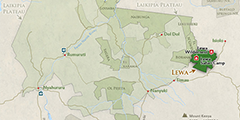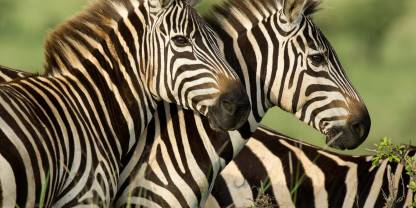More than anywhere else on the Laikipia Plateau, Lewa Wildlife Conservancy captures the pioneering tourism and conservation spirit of the region. Lewa is known for its outstanding conservation record and development work in the local community and its excellent accommodations. It’s also one of the best places in Kenya to see the , with sightings of and common. Lewa has a full suite of predators, and it’s a stronghold for the endangered .

-
Best Time To Go
- July to September (Little rain)
-
High Season
- June to October and December to March
-
Size
- 250km² / 97mi²
-
Altitude
-
1,479-2,106m /4,852-6,909ft
 View Photos
View Photos
 View Photos
+24
Photos
View Photos
+24
Photos
 Open Map
Open Map
Pros & Cons
- Excellent wildlife viewing with all of the present
- Great sightings of and
- , horseback riding and available
- Overnight camel treks available
- Excellent food and service
- Opportunities for engaging with the local community
- Stunning views of Mt Kenya and the surrounding landscape
- The cattle and fences can take away some of the wilderness appeal
- There is only a small animal-viewing circuit
Wildlife
Lewa Wildlife Conservancy offers excellent wildlife viewing. All of the are present, and the sightings of both and are unsurpassed. Elephant and buffalo are easily seen, while cheetah, leopard and lion are also possible. Really lucky visitors might come across a pack of as they move in and out of the area. Northern Kenya specials such as , and are also present.
More about Lewa's wildlifeScenery
Lewa is a beautiful place. Off in the middle distance, the snowcapped peak of Mt Kenya is the backdrop to many moments here whenever the clouds clear over the summit. The conservancy itself is dominated by rolling semi-arid grassy plains dotted with acacia trees, and several hills offer lookout points over the surrounding plains. At the heart of the conservancy, fringe a picturesque large swamp area.
Activities
Lewa Wildlife Conservancy has lots of excursions to keep you active and entertained. In addition to both night and day , where you’ll take part in wildlife and bird watching, you can go on a (with an armed guide). You can also enjoy horseback or camel riding, as well as visits to local communities, markets and schools.
Weather & Climate
Lewa is close to the equator, which makes for a really consistent climate. This consistency extends through the Dry season (June to September) when daytime sunshine and evening chill are normal. The Wet season (October to May) is less predictable. It begins with the short rains, followed by a drier period and then the long rains, which are at their drenching best in April.
More about the weather and climateBest Time To Visit
The downpours that mark either end of the Wet season (October to May) make roads inaccessible and see Lewa temporarily close its gates in November and April. It’s best to visit from July to September, which falls during the Dry season (June to September). This is when sunny skies lift spirits and animals are easier to see in the thinner vegetation. December to February, a drier period during the Wet season, is also good.
More about the best time to visit
